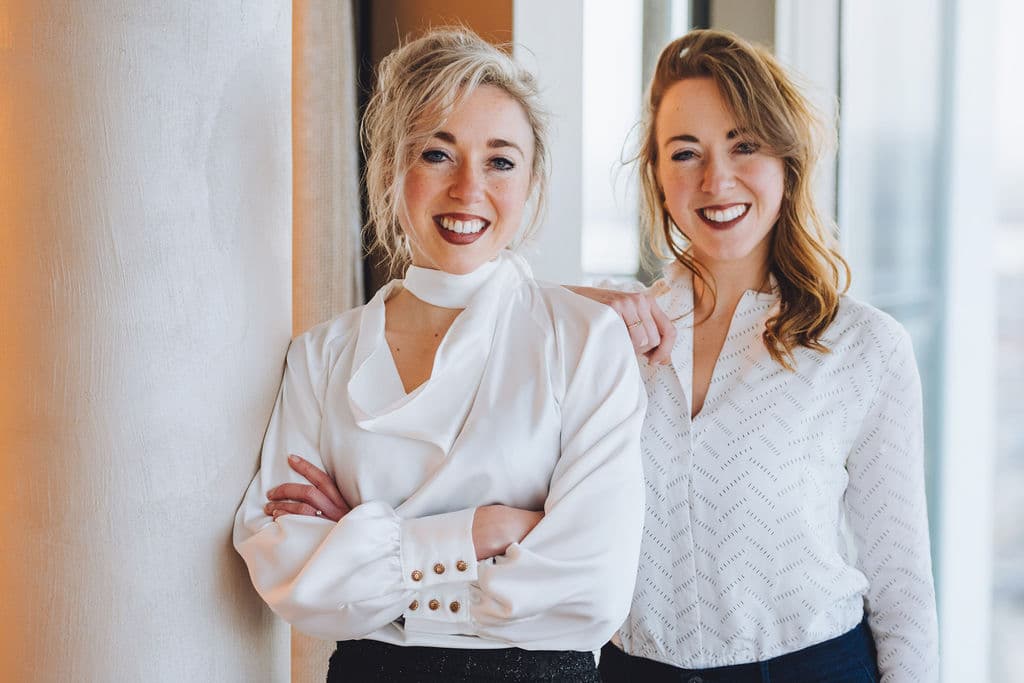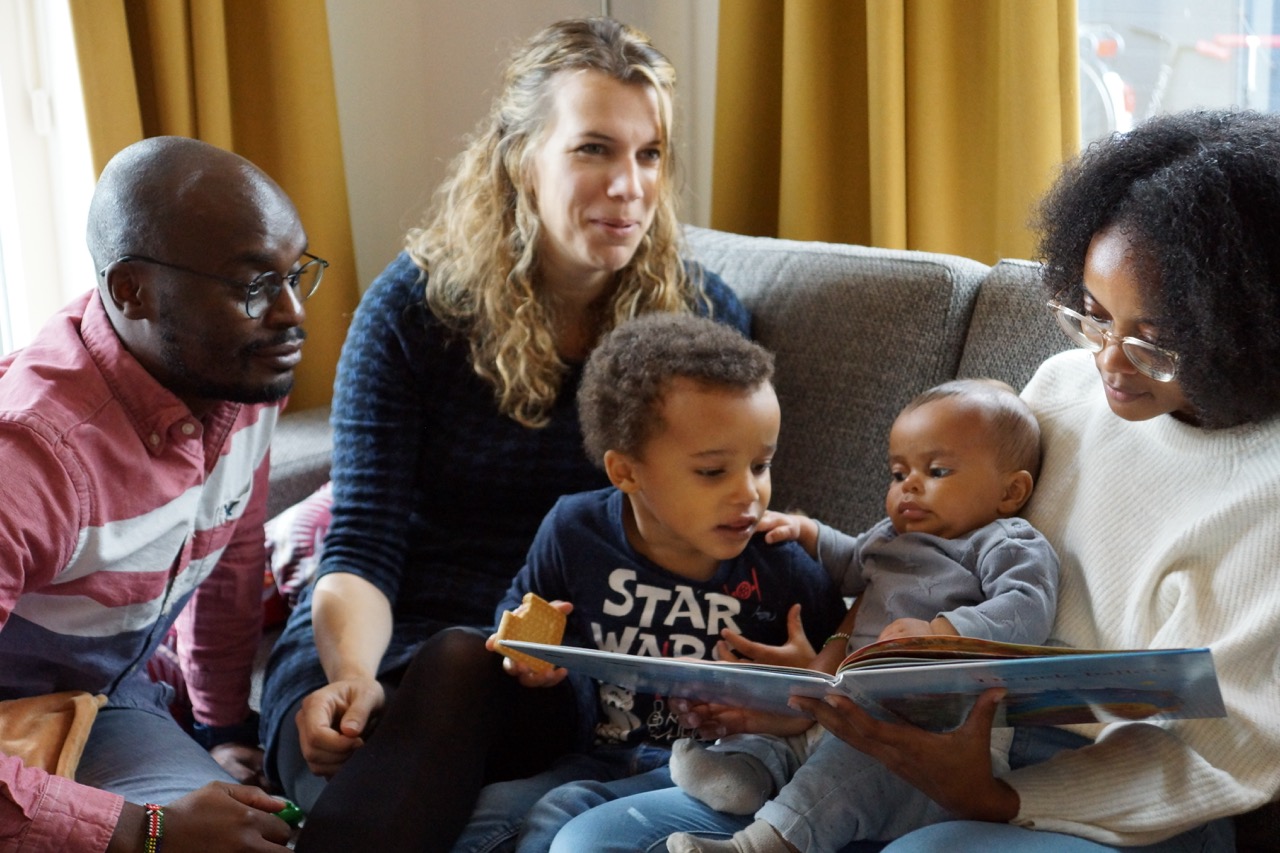Afra and Collins moved back to the Netherlands after spending a year in Kenya. A cross-continental move and the prospect of raising a toddler with a new baby on the way was a daunting proposition for them. They decided to host an au pair to help them through this stressful time. We wanted to learn more about their experience as a host family, so we went to their house to interview them.
We sat together in their cozy living room, Collins holding their new baby, Mella, and their toddler, Kas, snuggled between their au pair, Ruby, and his mom. Afra explained to us that she is Dutch and her husband is Kenyan. “We met around 2016. He was my Swahili teacher initially… We got married in 2020 and now we have two beautiful kids, Kas and Mel.” She was learning Swahili to prepare to move to Tanzania for an internship, which she did for 6 months.
Why did you decide to host an au pair?
Afra: When we were in Kenya, we had some extra help: a nanny who was mostly helping us with the kids, but also did some household chores. We realized it gave us so much space to do fun things with the kids instead of always having to do household things. It was a huge relief having a nanny around, so when we came back to the Netherlands this year — February — we really wanted to add an au pair to our family so that we could have some extra help around the house, especially because, at that time, I was pregnant. So the idea came from us having a nanny in Kenya.
Amanda: Did you [and your au pair] meet each other through us or did you already have connections [through] Au Pair World?
Collins: We did Au Pair World first. We had a friend actually who was also in Kenya. She was Dutch and she was moving back to the Netherlands and she was also getting an au pair. So it was actually through the conversation [with her] that we realized that we could also do that. We talked to her about what the process was, so she guided us through making an Au Pair World account. We went through some interviews with some au pairs and then she said ‘Hey, there’s [the] Nina.care agency that helps you with the process, you know, applications stuff’. That’s when we reached out to Nina.care and said, ‘Hey listen, we already have somebody that we’ve found already.’
How did you choose your au pair?
Am: And was it difficult to find a good match? Did you have certain things you were looking for?
C: Yeah, we had certain things we were looking for. One of the things that we were looking for was values. Somebody who was open-minded but also educated in terms of like, you read books with the kids and teach them maybe more of things that we could overlook. Also we wanted somebody from… Kenya just because we wanted to factor in [speaking] Swahili to the kids. Because it was important for us as well. So, I mean, we found a perfect match.
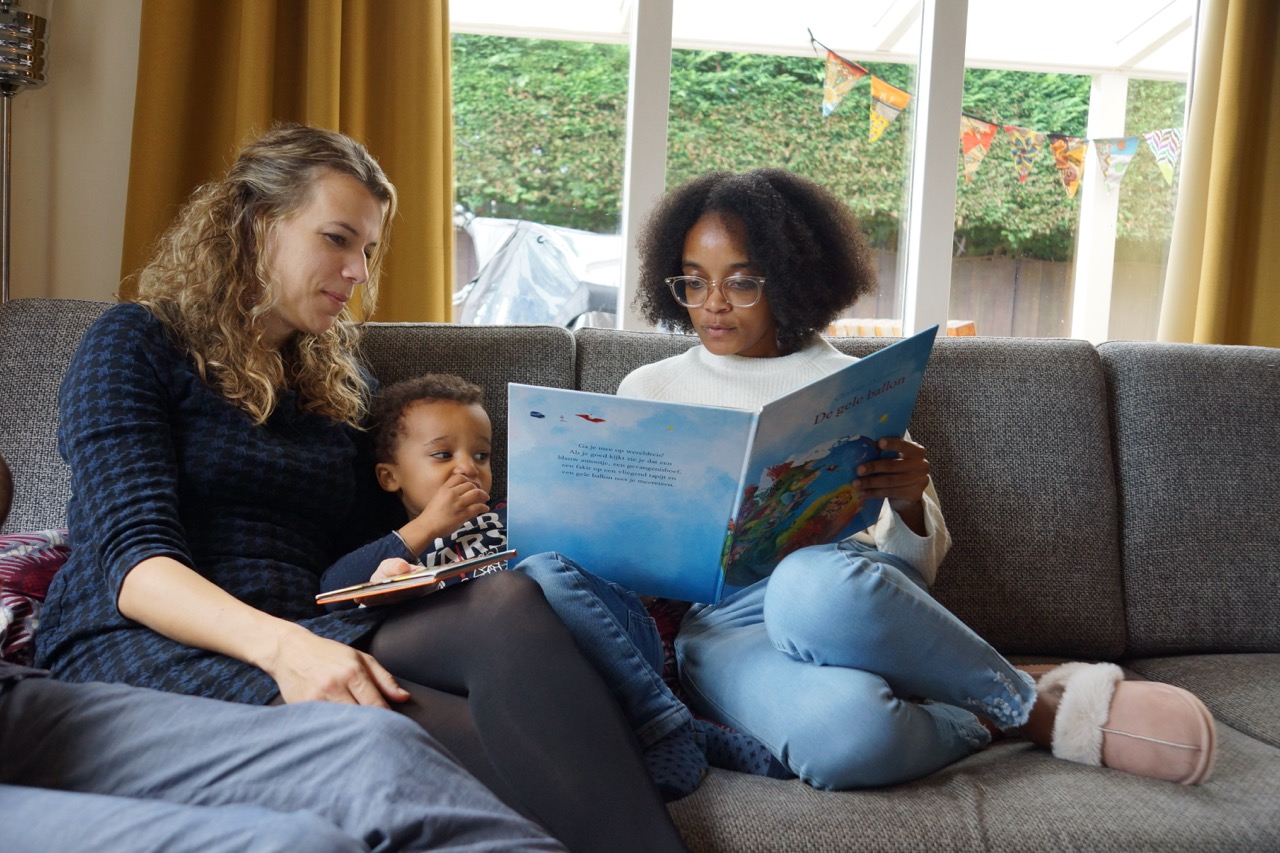
How did you manage expectations and house rules?
Am: Did you have certain expectations of an au pair or certain house rules you went through together, or [was it] just seeing as you go?
A: I think for us it was quite easy because we already got to meet in person in Kenya and talk about expectations. I also found that the tools that Nina.care offers are very helpful. You have to fill out a schedule so you can agree, like, ‘Okay, you’re going to bring the kids to daycare or school, you’re going to be cooking this and this night,’ those kinds of things. I don’t think we’re a very strict family but we’ve had…” Afra paused. “I think the Dutch culture is very direct so we did have some conversation about [not taking] it personal when we give you direct feedback, because in other cultures that can come across as very confrontational. So yeah, we felt that we had to tell Ruby that feedback is not something that you have to take personal, it’s just to make the process go better.
What are the biggest advantages of having an au pair?
Am: Yeah, I hear that a lot from host families. What would you say, now since having an au pair, are the biggest advantages? You said already that it gave you more time to spend with your kids, but do you have other things that you really like about having an au pair?
C: Yes, a lot of things. A lot of good things. One is… [that]… we have a little bit of space, you know, at this time I’m busy because of work and being productive, but at the same time after that I know there’s a schedule where I can spend time with the kids before they go to bed or the weekend. So it gives us space.
But obviously… I thought for me, personally, [Ruby] is kind of an easy match. She shares some cultural things and [the] same jokes, same language. It’s also like having a friend in the house, who you can talk to, communicate and not feel awkward. And it’s not like you have to explain yourself a lot, so that actually made it a bit easier. Also, I think with the kids I feel having somebody [they] can always go to if you’re not there, or even if they’re bad at us or something. So it’s that easy, it just takes some pressure off but at the same time gaining some friends as well.
A: I also think Ruby [is] in touch with a lot of other au pairs in this region, so it’s always easy to find a playmate for Kas, because she just texts other au pairs, like, ‘who wants to go on a playdate.’ So Kas has met a lot of kids in this area just through Ruby and her au pair network.
Was it hard for your children to get used to an au pair?
Am: I didn’t even think of that! Did you feel like it was hard, mostly for Kas, to get used to having Ruby around?
C: No. Well, it wasn’t hard but also that fact that we already met Ruby in Kenya, so it was a bit easier, because even when we travelled back we travelled with Ruby back. So we kind of eased into it, you know. But I don’t think it was hard. I mean, in the beginning maybe, like, ‘What’s going on here,’ but I think as he got used to it…” He paused. “But also, it’s kids, so they pick up really quick and then they realize, okay this person’s going to be here for a while. And even sometimes, there’s times when Ruby’s on vacation or something [and Kas] is like ‘Why are you on vacation.'” We all laugh. “Because she came back and Kas was like, ‘Don’t go on vacation again, okay!’ So… there’s this connection and, well, this is like part of the family now.
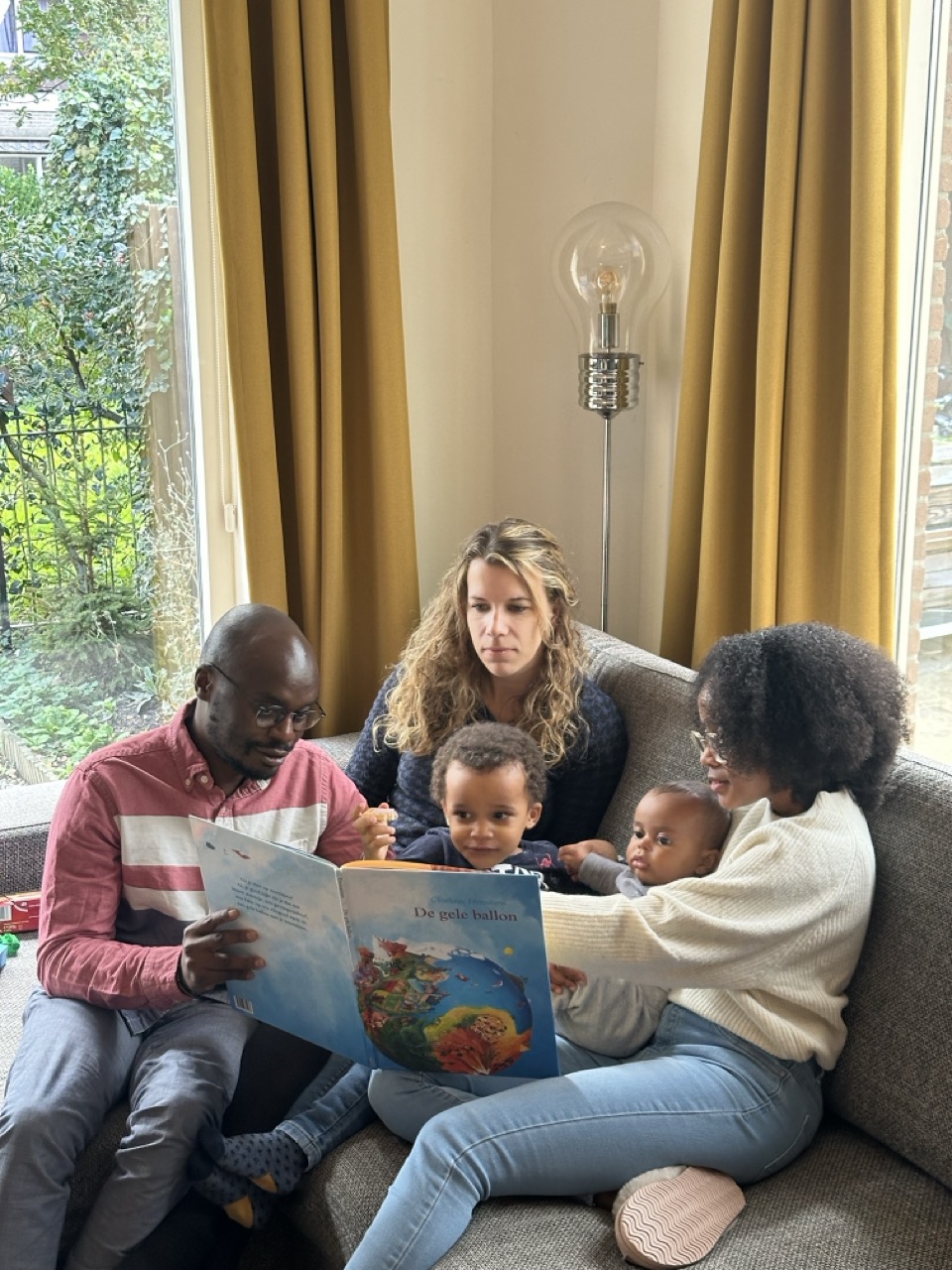
A: Yeah, it’s going to be tough when [Ruby] has to leave!
Am: Yeah, I was going to ask about that because of course, it’s max twelve months. Are you nervous about that? Do you think you’d like a new au pair?
A: So, I think we said we wanted an au pair to help us through the first few months with a new baby, yeah. I don’t think it would be easy to find an au pair who matches with our family as well. And since Kas is going to school, I think… we don’t need as much help anymore, and we haven’t started searching for another au pair, for now.
C: Yeah, I guess I would say it’s still in discussions. We still have to figure it out, because it’s also tough to have this person that you like, because the next person you always have to compare. And… that can get a little complicated, but yeah it’s in discussions. We have to figure it out.”
What are the biggest challenges of having an au pair?
Am: Alright, and what would you say are the biggest challenges you have encountered so far? Is there anything you struggle with? Like, I know for example a lot of host families say they have a lot of difficulty to balance their privacy and spend time together with the au pair. Do you experience that?
A: No, no. No, because I enjoy hanging out with you [Ruby] as a friend as well.
C: I mean, we don’t. I think sometimes we hang out together if it’s in the evening watching TV shows. I mean, they’re going to a concert in a month together, so I don’t think there’s big challenges that we find. To be honest, it’s just that one extra person you need to kind of pay attention to. That’s the only extra thing… If [the au pair] was speaking a different language, but you know we like that so we encourage her to speak different languages to the kids so that they grow up that way.
A: Yeah the only thing for me that comes to mind is we had to sort of give up our guest room of course because Ruby is using that. So we don’t have a guest room right now, which makes it tougher for my father who lives far away to come visit, but that’s something that can easily be worked out. But I think in general, no, there are no major challenges.
Am: How would you say you communicate boundaries in the house? You might be more direct as you are Dutch, but how do you guys deal with that?
A: Yeah, if an issue occurs we just sit down and talk about it,” Afra stated. “But yeah, I can’t recall any time we really had to set boundaries. And Ruby usually just asks if she wants to have some friends over or something that might cause noise or whatever. She always asks. We actually enjoy having people over. I kind of like having a busy house so it’s kind of cool.
Am: Nice, so you have kind of an open communication.
C: Yeah, it’s very open communication. I think from the beginning when we first did the interview, that was the whole point: trying to find somebody who understands that you need to be able to communicate easily and not be scared. Different cultures have different [ways] they manage things, but I think it was important to figure out somebody who understands that this is the Dutch culture because Afra is Dutch, but also I’m Kenyan, so I had a different culture. And in between obviously we have some differences, but it’s a matter of listening. Some things you don’t take personal because it’s not what you think it is. But also if something is really strong and personal then you need to reach out and say, “Listen, this is too far,” or, “I don’t like this, I don’t appreciate this,” and we discuss how to figure it out and our way forward.
How did people in your surroundings respond to you having an au pair?
Am: How did people in your surroundings respond to you having an au pair? Do you have other friends who have au pairs as well, or was it a bit of a taboo at first?
A: I think an au pair is always seen as very fancy, right? I think an au pair is always seen as something for super rich people, but for us the costs have been about equal to one day of daycare for them, so I think it’s not something only for super rich people. It’s also for normal families to have a little extra support around the house.
C: Yeah, I think it’s generally, coming back [to] the Dutch culture, you’re like, ‘Why would you spend extra money on this person?’ But for us it was more like, spending time in Kenya, we realized [that] we needed some help, especially when we are having a new baby and just getting adjusted back into the Netherlands community. So I don’t think it’s more of a shock, but it was more like, “Okay, why are you doing this,” “Let me explain,” and then they understand. But some love it. I mean, they come, they meet Ruby, and even sometimes some of them are like, “Hey, I’m coming over but I’m not scared because I want to bring the kids, because Ruby’s around to play with the kids.” And it’s easy that way. So I don’t think there’s much of a shock. Most of our friends… I don’t think any of our friends have au pairs actually.
A: We know two other couples who also have an au pair and I think it’s been a positive experience for them as well. I think especially if you have kids that are quite far apart in age. Kas’ needs are completely different from Mella’s right now. So it’s nice to have an au pair for extra hands around the house to help take care of Kas, get him ready in the morning, and I can focus on Mella while Ruby is focusing on Kas or the other way around.
We also let them go to daycare a few days a week, but less than we would have otherwise. Yeah, daycare is very expensive, especially if you’re just above that income where you get funding from the government. It’s quite easy to have it make sense financially. But I think the choice really depends on if you want to have somebody around the house that much. And I think for us we really like that. We really enjoy having an extra person around the house who can teach the kids new things who can help us out. Some people might not want that because as you said it might feel it’s an invasion of their privacy.
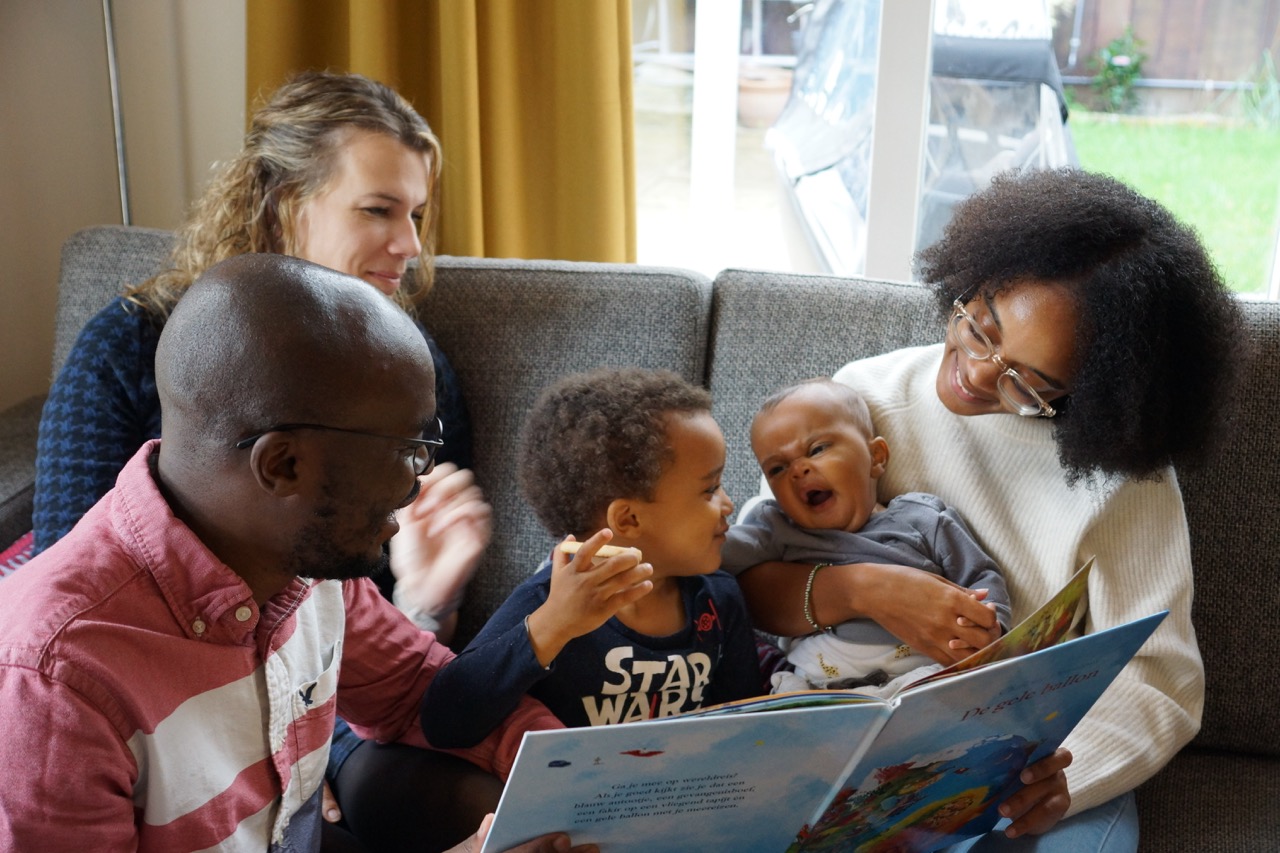
Would you recommend au pairs to other people?
C: Yes. But again, it depends on who the people are, and if they’re struggling. There are some people I could definitely recommend it to who I know are struggling. Like, yeah, [tell them] this is a different option for you, definitely. Some people just get stuck because one of the requirements is the extra room, so some people don’t have that. THat can get a little bit complicated. But definitely, sometimes I think if you’re a person who has a lot of kids and you also need to take some time to work and stuff I think it’s kind of the right option there.
Why did you choose Nina.care?
C: Yeah, Pamela. She recommended you to us.
A: I think it makes the visa application way easier. We didn’t want to sort out how to do that.
C: I mean, me coming from Kenya as well, I can understand how the process is strenuous. And we didn’t want to go through that, so we were like okay, ‘What is it?’ and [Pamela] was like, ‘Yeah, but Nina.care does everything for you.’ We were like, ‘Yes! We don’t want to worry about it, here you go do whatever you need to do.'” Collins was emphatic about the prospect of not needing to deal with the bureaucracy that can come with navigating the practicalities of having an au pair alone.
A: And we heard that Nina.care organizes language classes and opportunities, which seemed like a really good idea to help Ruby find her way here in the Netherlands, make some friends, you know.
In all, Afra’s family has found an amazing match with Ruby, who fits in with their family and provides the parents with a much-needed support and peace of mind while they readjust to life in the Netherlands and adjust to life with two small children.
